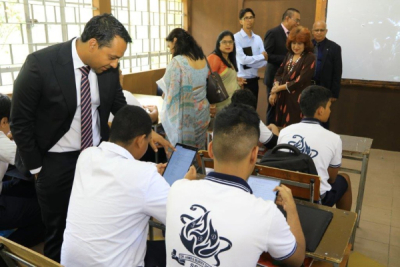Bosso was founded on the idea of making construction material procurement simpler and more affordable for businesses and individual builders.
Bosso is an e-commerce platform developed by a Zambian startup. It aims to digitize the construction supply chain, a sector facing significant challenges in accessing affordable materials and efficient logistics in various African countries. The Lusaka-based startup was launched in 2022 by Chisepo Chirwa.
“Bosso is Zambia’s leading e-commerce platform for building materials. Over the last year, we have helped over 800 hardware stores stock inventory and over 400 home builders source their materials, and we have raised $400,000 in venture capital,” the startup said on its LinkedIn page.
Through an integrated e-commerce platform, Bosso allows its users to find, compare, and order a wide range of essential products online, from cement to timber, aggregates, and tools. It provides price transparency and more reliable delivery options. It connects both suppliers and end buyers through a single online platform, simplifying a process that has long been fragmented and time-consuming.
The platform is not limited to a simple catalog. Through partnerships with financial institutions, Bosso also offers flexible solutions such as “Buy Now, Pay Later” (BNPL), payment facilities, and other innovative options aimed at improving access to financing for construction projects.
By combining digitalization, supply transparency, and financial solutions, Bosso positions itself as a key player in the construction industry’s digital transformation across Africa. It could help transform a traditionally inefficient market into a more accessible and agile ecosystem.
Adoni Conrad Quenum
- Gabon adopted a draft ordinance to regulate digital archiving during a cabinet meeting on January 29.
- The framework aims to govern electronic records, public archives, and digital service providers.
- Gabon scores well on cybersecurity legislation but shows major weaknesses in technical capacity.
The Gabonese government now wants to establish a legal framework for digital archiving in the country. The cabinet adopted a draft ordinance on January 29, during a Council of Ministers meeting.
According to the authorities, the initiative fits into the national archiving policy and sets principles and rules for the creation, preservation, management, and use of electronic and digital documents. The framework also regulates companies that provide digitization and electronic archiving services.
The Ministry of Digital Economy said the measure enables the creation, preservation, and security of administrative documents in digital form. The ministry added that the framework improves the organization and protection of state archives. The ministry also said the framework regulates providers that digitize and store electronic records.
This initiative aligns with Gabon’s broader digital transformation agenda. The authorities want to integrate digital technology across all sectors of the economy. The government expects digital archiving to improve efficiency, reduce data loss, and increase transparency, particularly in public administration.
Since July 2025, the government has explored local solutions for electronic document management. The authorities have engaged companies such as CompanyViene and ST Digital. In early December, the government organized a workshop that brought together sector stakeholders. The workshop aimed to lay the foundations for an integrated and secure system to archive judicial records and improve their processing and public access.
However, digital archiving raises security concerns amid rising cyberattacks and cybercrime in Africa. The International Telecommunication Union ranked Gabon among the least advanced countries in cybersecurity in its 2024 Global Security Index. The ITU said Gabon established a favorable legal framework for cybersecurity and awarded the country a maximum score of 20 out of 20 in that category. However, the ITU identified gaps in organization, capacity building, cooperation, and technical measures. The country scored 0 out of 20 in those areas.
This article was initially published in French by Isaac K. Kassouwi
Adapted in English by Ange J.A de BERRY QUENUM
- Cabo Verde launched a €400,000 digital skills program to train up to 3,000 young people for remote and freelance work.
- The program targets youth at home and in the diaspora and aligns training with global market demand.
- Youth unemployment stands at 27.8%, while internet penetration reached 73.5% in 2023.
The Cabo Verde government launched the “Skodji Digital” program last week to train up to 3,000 young people in digital skills. The initiative carries a cost of 400,000 euros, or about $477,000. The government designed the program to help young people participate in the global gig economy, access remote work opportunities, and develop digital microenterprises.
In its first phase, the program will directly support 1,050 participants, including young people living in Cabo Verde and members of the diaspora. The government has opened applications and will keep them open until February 25 through a dedicated online platform. Training programs will last between two and six months, depending on the specialization.
“Skodji Digital provides structured training in digital skills aligned with global market demand, supported access to international digital employment and freelance platforms, activation of careers in emerging digital sectors, and dedicated pathways for digital entrepreneurship and the creation of micro-entrepreneurial initiatives,” the government said in a statement.
The initiative fits into Cabo Verde’s broader digital strategy, which focuses on expanding digital services, attracting international companies, hosting remote workers, and investing in local skills. The country has strengthened cooperation with Portugal to position itself as a pool of digital talent for Portuguese companies. Both sides aim to align training programs with labor market needs and create an environment conducive to testing technological solutions.
The government also views the program as a tool to address unemployment. Cabo Verde has a population of about 600,000 people, mostly young, according to the African Development Bank. The bank reports an overall unemployment rate of 14.5%. Youth unemployment reaches 27.8%, including 33.4% among women and 22.9% among men.
However, the expansion of the gig economy and remote work depends on reliable internet access. According to the International Telecommunication Union, Cabo Verde recorded an internet penetration rate of 73.5% in 2023.
This article was initially published in French by Isaac K. Kassouwi
Adapted in English by Ange J.A de BERRY QUENUM
- Abena Adoma founded Techies4Impact in 2023 to support community-driven digital projects in Ghana.
- The organization promotes technology as a tool for social impact rather than pure economic performance.
- Techies4Impact works with students, project leaders, and volunteers to build practical digital skills.
Abena Adoma is a Ghanaian technology specialist. She founded Techies4Impact, an organization that brings together digital professionals and enthusiasts around socially useful projects. She bases her approach on entrepreneurship and innovation as drivers of positive and lasting impact.
Founded in 2023, Techies4Impact aims to become a reference platform for individuals who want to use technology to act directly on their environment. The organization promotes a clear vision that positions digital technology as a tool that serves communities rather than a simple engine of economic performance.
Techies4Impact supports technology initiatives designed to address everyday challenges. The organization operates notably in schools, where it helps students move beyond passive technology use and become creators. This support includes access to computers and the development of essential digital skills.
The organization targets young people, students, project leaders, and volunteers who want to use digital tools to support their communities. It positions itself as a collaboration hub that connects learners, trainers, and individuals willing to fund or support the projects developed.
Abena Adoma earned a bachelor’s degree in business administration from the Kwame Nkrumah University of Science and Technology in Kumasi. She began her professional career in 2020 at Spectrum Fibre Ltd in Ghana, where she worked as a human resources administrator. From 2022 to 2024, she worked at Broadspectrum Digital Payments, a fintech company, where she held roles as business development assistant and technology operations analyst.
This article was initially published in French by Melchior Koba
Adapted in English by Ange J.A de BERRY QUENUM
- Sabi Yarou Sika OROU N’GOBI founded KryptaPay in 2022 to enable peer-to-peer cryptocurrency trading.
- The platform allows users to retain full control of funds and set prices directly.
- KryptaPay targets low-cost transfers from the diaspora to Africa and caps fees through a no-withdrawal model.
Sabi Yarou Sika OROU N’GOBI is a Beninese blockchain expert, developer, and technology entrepreneur. He founded and now leads KryptaPay as chief executive officer. He designed the platform to enable the purchase and sale of cryptocurrencies through simple and secure peer-to-peer exchanges.
KryptaPay launched in 2022 and prioritizes fund protection, transaction speed, and cost reduction. The platform allows users to buy, sell, and exchange cryptocurrencies through a peer-to-peer model. Users retain full control over their funds, select their transaction partners freely, and set their own prices within the marketplace. The system collects and distributes funds almost instantly.
KryptaPay also offers low-cost international money transfer services, particularly from the diaspora to Africa. The platform allows up to 1,000 fee-free transactions as long as users do not request withdrawals. KryptaPay never holds cryptocurrencies on its balance sheet. The platform routes digital assets directly between users, which strengthens security and improves transaction transparency.
Users can generate additional income through an active referral system linked to trading activity. Each user accesses a personal dashboard that tracks financial activity in real time. KryptaPay also operates a certified seller program that provides exclusive benefits, a user-based rating system, and responsive customer support.
Alongside his entrepreneurial activities, Sabi Yarou Sika OROU N’GOBI works as a consultant, trainer, and expert in blockchain, decentralized finance, and Web3 technologies. He also serves as a Binance Angel, a role that involves promoting Binance and its products across Africa. Between 2021 and 2022, he worked as a freelance community manager.
He earned a two-year degree in transport and logistics in 2011 from the University Institute of Technology of Parakou in Benin. He obtained a master’s degree in blockchain and Web3 in 2023 from the online education platform Founderz. He also completed web developer training at International Consulting Canada. He currently pursues a bachelor’s degree in management and business development at Burgundy School of Business in France.
This article was initially published in French by Melchior Koba
Adapted in English by Ange J.A de BERRY QUENUM
- Mauritius launched mytGPT Education, a generative AI learning assistant developed by Mauritius Telecom and the Ministry of Education.
- The country ranked first in sub-Saharan Africa on the 2024 Government AI Readiness Index.
- The government began a pilot program in eight public schools covering primary and secondary grades.
Mauritius has integrated generative artificial intelligence into its education system through the launch of mytGPT Education, a teaching assistant developed by Mauritius Telecom and the Ministry of Education. The authorities officially launched the tool on Monday, January 26. The government aims to modernize learning and teaching practices nationwide.
“The implementation of mytGPT Education in schools fully aligns with our strategy, which aims to make artificial intelligence a tool for national progress that is accessible to everyone. Through this project, every child in Mauritius will have access to an AI teaching assistant capable of supporting learning,” said Veemal Gungadin, chief executive officer of Mauritius Telecom.
MytGPT Education relies on generative AI technologies designed to deliver personalized academic support to students. The platform provides explanations tailored to each learner’s level, interactive exercises, and secure content available in English, French, and phonetic Creole. For teachers, the tool automates the creation of quizzes and teaching materials and integrates student performance analytics to guide instructional strategies more precisely.
The government has deployed the project initially as a pilot program for students in Grades 4, 7, 8, and 9. The pilot covers eight schools, including four primary schools and four state secondary schools across the country. The platform already integrates more than 50 teaching resources aligned with the National Curriculum Framework. In parallel, training sessions held between December 2025 and January 2026 introduced teachers to artificial intelligence fundamentals, platform usage, and best practices in prompt engineering.
Through this experiment, Mauritius aligns with a global trend that explores the use of generative AI in education, a segment that remains nascent in African countries. The project opens the way for more personalized learning and optimized teaching resources. However, nationwide scaling will depend on several factors, including the platform’s technological robustness, its integration with existing education systems, data governance for student information, and the education system’s capacity to support teachers in adopting these digital tools over the long term.
This article was initially published in French by Samira Njoya
Adapted in English by Ange J.A de BERRY QUENUM
Wema Bank is now accepting applications for its Hackaholics Accelerator 2026, aimed at Nigerian tech startups that have been operating for at least two years and are already generating revenue. The programme offers mentorship, technical support and access to investors and corporate partners, as well as guidance on scaling up. Founders are required to participate for the full duration of the hybrid programme and apply through the bank’s online portal.
VivaTech is now accepting applications for its AfricaTech Awards, which recognise some of the continent’s most innovative startups. Six finalists will pitch in Paris on June 17-20, 2026, ahead of the global awards ceremony. The competition is open to startups headquartered in Africa that have raised at least $150,000 in funding. Applications close on February 16.
Nigerian crypto platform Obiex is preparing to expand into Ghana and South Africa after a sharp jump in trading volumes. Launched initially as a crypto off-ramp service, it took off with its “no-confirmation swap” feature, which locks in prices and protects users from volatility during confirmation lags. Already active in Cameroon, Obiex is now targeting some of Africa’s biggest markets.
- Morocco signed three agreements to strengthen training, territorial attractiveness, and high value-added digital offshoring projects.
- The offshoring sector employed about 148,500 people and generated 26.2 billion dirhams in export revenue by the end of 2024.
- Authorities aim to double sector performance by 2030, targeting 270,000 jobs and nearly 40 billion dirhams in exports.
Morocco signed three agreements on Tuesday, January 27, in Rabat to reinforce its digital offshoring ecosystem. Authorities concluded the agreements on the sidelines of a meeting focused on renewing the country’s national offshoring offer. The partnerships aim to support skills training, improve territorial attractiveness, and encourage the establishment of high value-added projects.
The agreements focus in particular on the rollout of a training incentive designed to align workforce skills with the needs of digital companies. They also provide for the development of Tech Valleys Offshoring through the creation of specialized economic hubs. These hubs will integrate technological infrastructure, shared services, and dedicated spaces to host both domestic and international investment.
The signing of these agreements comes as the global offshoring market undergoes rapid transformation driven by service digitalization, cloud computing, data expansion, and artificial intelligence. In this new environment, traditional destinations now compete with emerging hubs, especially across Africa.
Morocco seeks to consolidate its position by promoting a more structured offering that focuses increasingly on digital professions and high value-added services. Authorities see this repositioning as essential to maintaining competitiveness in a shifting global landscape.
Offshoring now ranks among the main contributors to Morocco’s service exports. By the end of 2024, the sector employed nearly 148,500 people and generated more than 26.2 billion dirhams ($2.8 billion) in export revenue.
At the same time, activities are gradually evolving. Traditional call centers are losing ground, while IT services, engineering, and specialized digital functions continue to expand. Moroccan authorities aim to double the sector’s performance by 2030, targeting 270,000 jobs and nearly 40 billion dirhams in exports.
Through these partnerships, the government aims to enhance the competitiveness of the “Made in Morocco” digital services offer on the global market. Authorities expect skills development, the structuring of specialized territorial hubs, and increased investor visibility to serve as the main growth levers.
Over time, these agreements could help attract new technology projects, support qualified employment, and strengthen Morocco’s position as a regional digital services platform serving both European and African markets.
This article was initially published in French by Samira Njoya
Adapted in English by Ange J.A de BERRY QUENUM
More...
- Tunisian engineer Khouloud Abada founded RenYou in 2023 to structure long-term skin health monitoring.
- The application combines artificial intelligence with direct support from dermatologists and medical specialists.
- RenYou integrates lifestyle and nutrition factors into dermatological follow-up.
Khouloud Abada is a Tunisian entrepreneur and a trained engineer specializing in chemical process engineering. She founded and currently leads RenYou, an application designed to support people seeking better skin care through direct involvement of doctors and dermatology specialists.
Founded in 2023, RenYou introduces a new approach to telemedicine applied to skin health. The application aims to simplify the care pathway while ensuring monitoring under the supervision of healthcare professionals. The platform prioritizes personalized support tailored to each user’s needs rather than a standardized solution.
The platform relies on artificial intelligence to help users understand their skin condition, track changes over time, and receive structured guidance to treat dermatological issues. RenYou emphasizes accessibility by simplifying access to information and follow-up tools, allowing users to manage their skin care autonomously and continuously.
At the same time, the application adopts a holistic approach. RenYou does not treat the skin in isolation but incorporates factors such as diet and lifestyle that directly affect skin health. This approach reflects the idea that skin health often mirrors overall living habits. In line with this vision, RenYou also develops educational content aimed at informing and raising awareness beyond the application’s core use.
Khouloud Abada graduated from the Preparatory Institute for Engineering Studies in Tunis, where she earned a bachelor’s degree in applied sciences in 2016. She later obtained a master’s degree in energy from the University of Tunis in 2020, followed by a master’s degree in mechanical engineering in 2021 from the Frankfurt University of Applied Sciences in Germany.
She began her professional career in 2020 as a chemical process engineer at Medis, a company specializing in licensing generic medicines to pharmaceutical groups. From 2021 to 2023, she worked as a mechanical engineer at Audi UK within the British automotive group, before fully committing to her entrepreneurial project with RenYou.
Melchior Koba
- Moroccan entrepreneur Karim Beqqali founded Yakeey in 2022 to centralize real estate transactions on one digital platform.
- Yakeey integrates listings, advisors, notaries, banks, and insurers into a single transaction workflow.
- The platform targets market inefficiencies in buying, selling, and renting property across Morocco.
Karim Beqqali is a Moroccan serial entrepreneur and the founder and chief executive officer of Yakeey, a real estate platform launched in 2022. The company seeks to transform how individuals buy, sell, and rent property in Morocco.
Yakeey positions itself as a centralized platform that aggregates all services related to a real estate transaction. The platform offers verified listings for houses, apartments, villas, and offices for sale or rent, while integrating all key stakeholders involved in the process, including real estate advisors, notaries, banks, and insurance providers.
For buyers, the platform provides filtering tools based on property type, budget, city, or neighborhood. Users can request property visits and receive personalized follow-up from a dedicated advisor.
For sellers and landlords, Yakeey simplifies the transaction journey by offering free listing publication, online property presentation, and end-to-end support through closing. The platform assists with price setting, visit scheduling, and negotiation phases. Meanwhile, tenants access available listings and track the progress of their applications directly through the platform.
A key differentiating feature of Yakeey lies in the central role assigned to real estate advisors. Each user works with a single point of contact who supports the project from start to finish, including needs assessment, visit coordination, explanation of sale or rental terms, and preparation of administrative procedures.
Beyond Yakeey, Karim Beqqali also serves as founder and chief executive officer of Ynexis Group, a Moroccan investment group established in 2013. Earlier, in 2006, he founded the Moroccan subsidiary of U.S. real estate firm CBRE and led the operation until 2013, with responsibility for the North Africa region.
Beqqali graduated from ESSEC Business School in Paris after completing preparatory classes at École Sainte-Geneviève in Versailles. He also completed the High Potentials Leadership Program at Harvard Business School in Boston.
This article was initially published in French by Melchior Koba
Adapted in English by Ange J.A de BERRY QUENUM
The Tony Elumelu Foundation is now accepting applications for the latest round of its entrepreneurship programme. The initiative offers African entrepreneurs 12 weeks of online training, mentorship and $5,000 in seed funding. Successful applicants will also gain access to the foundation’s network and further financing opportunities. Applications close on March 1.
Qualcomm is now accepting applications for the latest round of its “Make in Africa” mentorship programme, aimed at tech startups across the continent. The equity-free initiative offers business coaching, engineering support for hardware and software development, and guidance on intellectual property protection. Applications close on Sunday, Feb. 15.















